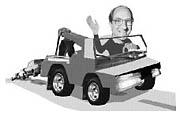Greg Nickels has jumped into the mayor’s race, kicking off Seattle’s 2001 election campaign.
Well, not exactly. Newspaper headlines notwithstanding, don’t expect to find the veteran County Council member from West Seattle knocking at your door any time soon. “I really don’t think of myself as a candidate until next spring, when actual citizens will actually care about the election,” he says.
Nobody was surprised at the announcement. Nickels might already be mayor had he had advanced to the final election against current incumbent Paul Schell (he trailed second-place qualifier Charlie Chong by 1,083 votes). Nickels formed an exploratory committee for a 2001 mayoral run earlier this year, then was outed as an actual candidate recently when he casually told a newspaper reporter that he’d decided to go for it.
His early start is probably a smart move. Nickels was hurt in 1997 by a trio of major delays—former Mayor Norm Rice waited until mid-April to bow out of the election, Nickels waited too long to declare himself an official candidate, and Rice hesitated for several weeks before endorsing Nickels. Although Rice’s backing gave the Nickels campaign unrivaled momentum in the days leading up to the primary, it wasn’t quite enough to catch Chong.
The amiable Nickels sure talks like a Seattle candidate. When asked if the proposed jump in the maximum campaign donation from $400 to $800 would help or hurt his campaign, he replied that he intends to raise the necessary funding with or without the rule change, then launched into an impassioned speech about why Seattle should go back to public financing of campaigns. Nickels also addressed tough issues such as preserving open space and fixing the streets (surprise!–he supports both).
He reflected on his mentor and friend Rice, whom he served as a council aide for eight years. Although some observers think Rice benefited from having a think-alike, compliant City Council (rather than the troublemakers and free spirits Mayor Schell has to deal with), Nickels argues that Rice’s “easy” victories were actually the result of countless hours spent building relationships with council members. He also likens his own political career to Rice’s—both are successful legislators who stumbled in their first two attempts to move up to higher office (Nickels also ran unsuccessfully for County Executive in 1993). But he’s no Rice clone. “Norm Rice is a friend of mine,” deadpans Nickels in mock-tribute to a famous presidential debate line. “And I’m no Norm Rice.”
Wanna-bes want open seat
Speaking of getting off to an early start, three would-be City Council members have already registered their 2001 campaigns with the city.
Curt Firestone, David Lawton, and Patrick Kylen have each run for council once, although Firestone is the only one of the trio to actually advance to the final election (against Margaret Pageler in 1999). However, there may be no open council seat for them to contest, unless incumbent Jan Drago decides to pass up a reelection bid and run for mayor (and she’s said she won’t do that unless Schell retires). Fellow incumbents Richard Conlin, Nick Licata, and Richard McIver are expected to run for reelection.
Monorail wins again
King County Superior Court Judge Kathleen Learned ordered the city to implement the Monorail Initiative or repeal it, proving that at least one public employee realizes initiatives aren’t simply friendly suggestions but actual laws written by citizens.
The city could appeal the decision, but why would they waste taxpayer money when City Council members can simply vote the monorail plan out of existence, like they’ve always wanted to? Due to the city’s delay tactics, it’s probably too late for monorail supporters to get a funding proposal on this fall’s ballot. Could it be that city officials fear backers could get a new Monorail initiative on the ballot in 2001? At least now doing nothing is no longer an option.
It’s in the numbers
Supporters of the effort to stop seizing the cars of those caught behind the wheel without a valid driver’s license say the law unjustly penalizes the poor. City Attorney Mark Sidran says the offenders aren’t necessarily poor people, just folks who are unwilling to do their civic duty by paying fines and making required court appearances.
Sidran’s point of view just got a little harder to sell. Figures from public defender organizations show that 95 percent of drivers arrested for third-degree violations of the license law (the folks who council members Nick Licata and Richard McIver would exempt from the impound requirement), meet poverty guidelines for free legal aid. How poor is poor? Annual total household income cut-offs range from $10,438 for a single person to $21,313 for a family of four.
Big brother is watching
Better government through coercion? Well, that’s not quite the case, but staffers for the city’s Ethics and Elections Commission may have found a strong-arm solution to a longstanding problem.
Under the code of ethics, about 2,000 Seattle employees are required to file a financial disclosure form outlining their financial interest in any company that does business with the city. However, employees have traditionally been lax in filing these statements, despite constant reminders. Ethics and Elections is now armed with a computer program that breaks down compliance rates by department and is threatening to post the results on the city’s internal web system next year.
Will a public shaming do the job? Probably. Checking their own compliance rate, commissioners deduced that one of their own number hadn’t turned in his paperwork. The guilty party, Commissioner Daniel Ichinaga, pulled out his pen and was in compliance within five minutes.






